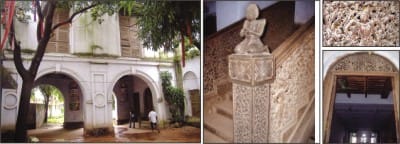Rescue Pogose house before too late

THE PORTICO OF POGOSE' HOUSE: Quiet and shrouded in greens in the midst of the hustle and bustle of Weisghat(left), an exotic statue on the railing of the wooden staircase (middle) and partial details of the ornamentation of the balustrade and woodwork on the top part of the main entrance(right). Photo:Durdana Ghias
Weis House, one of the magnificent structures built by Nicholas Pogose, an Armenian elite in the late 19th century, at Weisghat in the city is now under threat of being occupied illegally.
Locals say British civil surgeon Dr Weis later bought the house built by Pogose and so it is also known as Weis House. Bulbul Lalitakala Academy has been using the house since 1955.
According to the Banglapedia, Armenians came to this country from Central Asia and flourished in trade towards the end of the 17th century. Many of them turned into business tycoons and built palatial houses in the city.
Ruplal House, one of such houses that turned into a wholesale market at Farashganj, was owned by an Armenian called Aratoon.
Shamsuz Jahan Noor, acting president of the academy, said the house and the land is now under the threat of being occupied by some people.
The land is now a property of the Court of Wards as it is an estate of Sir Salimullah or the Nawab family, said academy sources.
Four big semi-circular arches on both sides of a big portico greet visitors to this grand palace. The portico has a wooden ceiling. Pilasters with projected designs stand in the middle of the arches.
A large open space lies in front of the house where big trees grew up lavishly spreading their branches over gigantic wooden lattice windows.
"These windows are called Louvered windows or khorkhori in local language. These windows were very suitable for our local climate. They were good for cross ventilation and protection from sunlight," said Conservation Architect Dr Abu Sayeed M Ahmed.
The hall on the ground floor has marble floor while rooms on the first floor have wooden floors. A decorated wooden staircase with floral motifs and sculptures in the balustrade is the most attractive thing.
There are four exotic wooden statues on four posts of the railing of the stairs in a state of prayer with an eerie expression on their faces. The sculptures in the banisters represent dancing figures, winged angels and also many forms of working class people.
There are similar wooden works on the top parts of the doors, leading to the vestibule on the ground floor. According to experts, the wood used in the balustrade was expensive Burmese teak wood.
A long spiral staircase, held by a cylindrical tower, leads up to the roof.
"The tower has perforated screens and is terminated by battlements," said Dr Sayeed. "The house is in a good condition and has no structural damage. It can be restored. One reason its wooded staircase and floor were not plundered is it has been under Bulbul Lalitakala Academy," he said.
The Pogose family contributed a lot to making educational and other institutions in the city. Pogose School established by them is one of the oldest schools of Dhaka.
"The house and the land is now under the threat of being occupied by some people who were expelled from the academy due to misappropriation of around Tk 55 lakh from 2004 to 2006,” said Noor.
"The corruption came to light after an audit done by the deputy commissioner's office. Following the audit we had to take action and expel two members," she said. “The audit is still going on."
"The expelled members are now trying to gobble up the land with the assistance of local influential people. They have a plan to demolish the house and build a super market with apartment building at this place. But if it happens the peace and tranquillity of the academy will be gone forever and we will lose the nice old place," said Noor.
"This is not only the building of the academy but also a part of the heritage of this country. It will be a misfortune if the house cannot be saved.”
She said it will be best if the Department of Archaeology takes hold of the house. “Then we will be assured of at least the safety of this place. An executive order from the government can also save the house."
"We have applied to the Land Reform Board for a lease. If we can have the lease then we will be able to put up a signboard declaring the lease and that will help us a lot to ward off the land grabbers," said Noor.
Contacted, two expelled members Amanullah Chowdhury and Nasir Ahmed, denied all allegations against them and said they are trying to save the land from the grip of the other group.
"We are trying to buy the land for the academy but the other party is trying to take hold of the land," said Nasir Ahmed.
Asked if they have any plan to demolish the house, Ahmed said he wants to keep the house as it is because it is a heritage building in old Dhaka.
Monirul Islam, chairman, Land Reform Board, said they have received an application in this regard and it is under consideration of the board.
He, however, could not specify when they can take a decision on the lease. "We have received an application and it is being examined. If there is no legal objection we will give them the lease," he said.

 For all latest news, follow The Daily Star's Google News channel.
For all latest news, follow The Daily Star's Google News channel. 



Comments